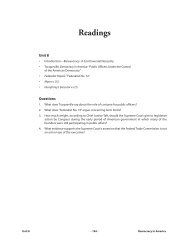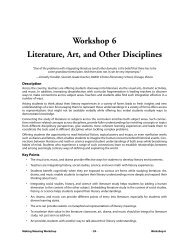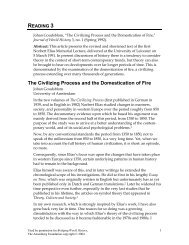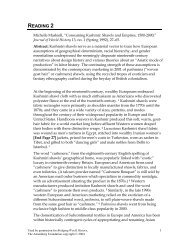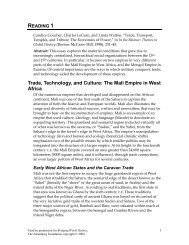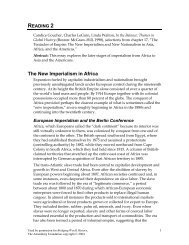UTOPIAN PROMISE - Annenberg Media
UTOPIAN PROMISE - Annenberg Media
UTOPIAN PROMISE - Annenberg Media
Create successful ePaper yourself
Turn your PDF publications into a flip-book with our unique Google optimized e-Paper software.
[6324] Sarony and Major, The<br />
Landing of the Pilgrims on Plymouth<br />
Rock, Dec. 11 th , 1620 (1846), courtesy<br />
of the Library of Congress [LC-USZC4-<br />
4311].<br />
8 UNIT 3, <strong>UTOPIAN</strong> <strong>PROMISE</strong><br />
AUTHOR/TEXT REVIEW<br />
William Bradford (1590–1657)<br />
Born in 1590 in Yorkshire, England, William Bradford was orphaned<br />
at a young age and reared by his grandparents and uncles to be a<br />
farmer. Bradford broke with his family in early adolescence, affiliating<br />
himself with the Separatist Puritans and thereby making a religious<br />
commitment that would profoundly influence the course of his life.<br />
The Separatists dreamed of creating a purified religious community,<br />
free of the hierarchies and worldly rituals that they felt contaminated<br />
the Church of England. The sect was known as “Separatist” because,<br />
unlike most Puritan congregations, it rejected the Church of England<br />
entirely instead of attempting to reform it from within. Bradford and<br />
his fellow Separatists paid a high price for their controversial beliefs:<br />
religious persecution led them to flee England for safer harbors in<br />
Holland and eventually in America.<br />
In 1620, Bradford and part of the congregation to which he<br />
belonged set sail for America on the Mayflower, bringing with them a<br />
patent granting them land in the territory of Virginia, where they<br />
hoped to set up their ideal church. Bad weather pushed them off<br />
course, and they landed well north of Virginia on the coast of what is<br />
now Plymouth, Massachusetts. There they began the difficult work of<br />
establishing a community in unfamiliar, and sometimes hostile, territory.<br />
Bradford was elected governor in 1621 and occupied that office,<br />
with only brief intermissions, until his death in 1657. In 1630 he began<br />
writing Of Plymouth Plantation, the history of his “Pilgrims’ ” religious<br />
and civil settlement in the New World.<br />
Bradford’s literary reputation depends, as scholar David Levin puts<br />
it, “as much on the quality of his historical intelligence as on the<br />
virtues of his style.” Indeed, Bradford’s text has long been celebrated<br />
for the “plain style” he endorses in its first paragraph. His simple yet<br />
artful prose, characterized by finely tuned sentences based upon the<br />
language and cadences of the Geneva Bible, is often regarded as a<br />
model of a specifically American style of writing. But, as Levin points<br />
out, Bradford’s text is no less notable for its historiographic project, a<br />
complex balance of religious exhortation and unvarnished reportage.<br />
Clearly, Of Plymouth Plantation is meant to serve as an account of<br />
God’s design in planting the Plymouth colony, interpreting events that<br />
might seem random or even commonplace to modern readers as evidence<br />
of God’s hand at work on earth. Bradford’s history extols the<br />
purity and strength of the first settlers in order to inspire subsequent<br />
generations to greater sanctity, combating what he perceived to be the<br />
spiritual decline of the community in the years following the initial<br />
settlement. While Bradford’s desire to read God’s will in the history of<br />
Plymouth colors his text—and frequently skews his understanding of<br />
non-Puritan people—his tendency toward exhortation is often balanced<br />
by an unflinching commitment to historical accuracy. He is surprisingly<br />
blunt in relating some of the troubles that plagued the<br />
Plymouth community, from rancorous differences between leaders to<br />
upsetting cases of sexual deviance among congregants. The result is a



